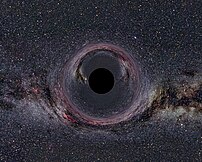
- Black hole. Image via Wikipedia
Nature abhors a vacuum, and this axiom does not apply merely to physical matter. When social establishments are obliterated, others move in to take their place.
The rapid decline of newspapers in the United States has hit science journalism hard. The Science section — if your newspaper actually had one — never had the same draw as a daily Sports section. Sadly, it also rarely brought in desperately-needed advertisement dollars.
The March 18th issue of Nature ran the news feature, “Science journalism: Supplanting the old media?” by Geoff Brumfiel, accompanied by the editorial, “Filling the void.”
Whereas some blogs are dedicated to covering science, Brumfiel writes, they often exists on the fringes of blogspace, marginalized from the more popular culture of politics, culture, and technology. One has to seek out science blogs. They are far from mainstream.
More importantly, few scientists blog. This is not because scientists are technologically illiterate. The system does not reward scientist-bloggers, but rather scientists who publish well, get cited prodigiously, and receive plentiful grants. Not only may blogging be perceived as a waste of time, scientists are often leery of peers who pump their work too much; they call these people “shameless self-promoters” (SSPs for short).
With science journalists being laid off in droves and scientists themselves not filling in behind, something has to fill the void. Often what is being pulled into this empty space are press-releases.
Now you might wonder what is the difference between news and press-releases. Both have the same style and structure. The chief difference is that the press-release comes from within the organization, and what comes from within is a glowing, uncritical view of facts, their interpretation, and their importance. Press-releases are advertisements disguised as news.
Responding to Nature’s survey of science journalists, one freelance science writer lamented:
Most of the time, the description of the scientific result in a press release is so dumbed down that I cannot find out what the result actually was in the terms of an expert! Instead of dumbing down the science to the level of the general public, we should be trying to educate the public.
What is filling the void is a poor substitute for good science journalism. In a dark, dystopic future, your health news may come directly from big pharma, your environmental news from big oil, and your business news from banks and insurance companies. “News” is taking on a completely new meaning.
If we become unwilling to pay for content and ignore advertisement and pledge-drives, we should not expect scientists to come to the rescue to educate the masses about science. The Fourth Estate is vanishing and we will get what we pay for.
Discussion
4 Thoughts on "Will Science Blogs Fill Void Left By Departing Journalists?"
Surely Nature’s viewpoint is completely unbiased here, and they have no vested interest in promoting blogging. It’s not like they’ve invested hugely in some sort of Network to enable users to blog, right?
The strongly opinionated nature of most blogs makes them a poor substitute for quality journalism (among other problems) as I’ve noted here:
http://www.cshblogs.org/cshprotocols/2009/03/20/begging-for-bloggers/
David,
You make an excellent point. Nature has invested a lot of resources — not to mention the time of their writers — in creating their own Nature blogspace http://blogs.nature.com/
While this may create a ripe opportunity to toot their own horn, they don’t. In fact, they advertise their competitors: Wired, Seed, Discover, and PLoS.
They’ve run 3 articles in the last month in 2 different journals entreating scientists to blog. It certainly raised my cynicism a bit, and seems like a coordinated effort to try to get the community behind providing the content that they need for their own network. I think the articles deliberately did not mention the Nature Network as that would have made things a bit too obvious. They may honestly feel that blogging is of great importance, but one must question the motivation behind such articles when they stand to benefit directly from the outcome. Just as Nature requires authors to declare any financial interests in research papers, I’d like to see them follow the same policy for editorials and be a little more up front about things.
![Reblog this post [with Zemanta]](http://img.zemanta.com/reblog_e.png?x-id=6f3d95e5-d34e-4e87-9c66-d39866089959)


